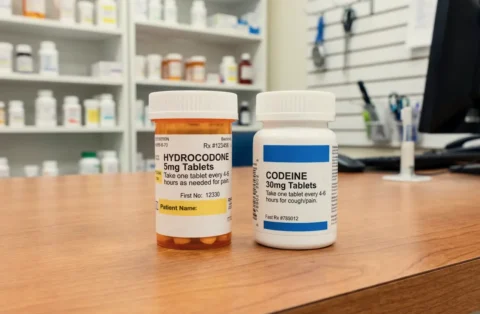What you’ll learn
We’ll cover what 7-OH is, why it can be risky, what withdrawal may feel like, and how people can begin treating kratom and 7-OH dependence, as well as understanding substance use disorder.
You might be here because you’ve been using kratom or a product with 7-OH, and lately… something doesn’t feel right. Maybe it started as a way to manage pain, boost focus, or ease withdrawal from opioids. And maybe it helped at first. But now, you’re noticing that stopping it isn’t so simple.
What you’re feeling has a name. And more importantly, it has a path forward.
If stopping kratom or 7-OH has felt harder than you expected, you’re not imagining it. What you’re experiencing may be 7-OH and kratom withdrawal.
These products affect the same parts of the brain as opioids, and for some people, that leads to real physical dependence, even when the substance is legal or marketed as “natural.”
If you’re feeling stuck, sick, or unsure how to stop, you’re not the only one. Many people have been in this same place: surprised by how strong the effects are, and unsure what to do next. But there is a path forward. There are ways to get better, without judgment, shame, or having to go it alone.
We specialize in helping people safely stop using 7-OH and kratom. Since these substances can’t be tapered, stopping completely is necessary before starting treatment. Our licensed addiction providers support patients through stopping and beginning treatment to help relieve cravings and withdrawal symptoms.
This guide is here to help you understand what 7-OH is, how it affects your body, and what your options are if you’re ready to taper, stop, or get more support using QuickMD.
How to quit 7-OH: your options and what to expect
There’s no one-size-fits-all way to quit 7-OH, but the safest approaches typically fall into one of three categories:
- Tapering off kratom slowly: Reducing your dose of kratom gradually over time can minimize your withdrawal symptoms. Tapering off of kratom works best when you track how much you’re using and work with a QuickMD provider who can help you pace the taper safely.
- Medication-Assisted Treatment (MAT): Medications like Suboxone® (buprenorphine/naloxone) will help stabilize your system after you stop using 7-OH, which will prevent the cravings and withdrawal symptoms that occur with stopping these substances.
- Behavioral and emotional support: Counseling, support groups, and therapy can all help address the mental and emotional side of kratom or 7-OH dependence. Many people benefit from a combination of medical and emotional care.
What is 7-OH, and why is it so potent?
If you’ve seen “7-OH” at a vape shop or online, you might have wondered what exactly it is and why it hits so hard.
7-OH is short for 7-hydroxymitragynine, which is one of the main active compounds found in the kratom plant (Mitragyna speciosa), a plant native to Southeast Asia. People in that region have traditionally used kratom for pain relief for generations.
But it’s not just any part of kratom. It’s the most powerful one. In fact, 7-OH is much more potent than kratom’s other well-known compound, mitragynine, and can produce analgesic effects similar to prescription opioids.
7-OH and opioid receptors
Even in small amounts, 7-OH binds tightly to the brain’s mu-opioid receptors, the same ones that drugs like morphine, oxycodone, and heroin act on. That’s why you might see it described as “just like an opioid,” and why it can bring fast relief from pain or withdrawal.
This doesn’t mean you’ve done something wrong. It just helps explain why stopping suddenly can feel so difficult.
Unlike the whole kratom leaf, which contains dozens of alkaloids that balance each other out, 7-OH is a concentrated extract. That means higher strength, faster onset, and often more intense effects, good and bad. Concentrated forms of 7-hydroxymitragynine are often poorly labeled, lacking dosage instructions and warnings, which increases the risks associated with its use. And when it’s taken in forms like tablets, capsules, or especially vapes, it bypasses the slower, traditional methods like tea or raw leaf, leading to a quicker spike in the brain.
This is part of why so many people feel caught off guard. You didn’t mean to get dependent. You were just trying to feel okay.
7-OH being legal doesn’t mean it’s safe
Right now, 7-OH is still technically legal in most of the U.S., but unfortunately, that doesn’t mean it’s safe. According to the National Survey on Drug Use and Health, an estimated 1.7 million Americans aged 12 and older report using kratom, a number that continues to grow.
Synthetically produced 7-hydroxymitragynine is being sold in dangerously high concentrations. Kratom and its ingredients, including 7-OH, remain in a legal gray area. The FDA has issued multiple warnings about kratom products, and while they’re not classified as controlled substances, the DEA keeps them on its radar as potential drugs of concern.
But why is it still legal in so many places? Despite acting like a strong opioid, 7-OH isn’t federally scheduled; it just can’t legally be sold as a “drug product.”
Without regulation, there’s no quality control, which means you often have no idea how much 7-OH you’re actually getting. Some states have started to restrict or ban it, but for now, it’s often found in gas stations and smoke shops under names that don’t make it obvious what’s inside.
What 7-OH dependence feels like, and why it happens so quickly
If you’ve been using 7-OH or strong kratom extracts for a while, you might have started noticing some changes.
Dependence doesn’t always announce itself loudly. Sometimes missed doses feel off, you start planning your day around timing, and then suddenly you can’t stop without getting sick.
Over time, your body starts adjusting to the presence of the drug. This is what we call tolerance.
And when your brain and body have adapted, stopping suddenly can feel too overpowering.
Signs of 7-OH or kratom withdrawal
If you’ve tried to stop using 7-OH and felt unwell afterward, that’s actually a pretty common experience. Withdrawal symptoms can resemble those from traditional opioids:
- Muscle aches and body pain
- Insomnia
- Nausea or vomiting
- Sweating and chills
- Anxiety, agitation, or depression
- Loss of motivation
- Sneezing, watery eyes, and a runny nose
- Diarrhea
- Restlessness
- A deep sense of emotional flatness called anhedonia (the inability to feel pleasure)
These symptoms can start as soon as 12 to 24 hours after the last dose, and peak within a few days.
But for some, especially after high or long-term use, they can drag on for weeks, what’s known as post-acute withdrawal. That’s when lingering symptoms like low mood, poor sleep, or brain fog stick around, even after the worst physical part is over.
It can be disorienting. Something that felt natural or safe now has you stuck in a loop you didn’t see coming. That’s not your fault.
But please hear this: you’re not alone, and your reaction is not unusual. Many people who turned to kratom or 7OH with the best intentions, to get through pain, to get off other drugs, to manage anxiety, find themselves in the exact same spot.
Want to learn more about kratom and 7-OH? Check out our blog for up-to-date information to help you stay informed.
Why Suboxone® can help, even if you started with kratom products, not heroin
If you’ve been using 7-OH or kratom and feel like you’re stuck, you might be wondering if Suboxone® is “too serious” a treatment. Maybe you’ve thought, “I’m not on fentanyl or heroin, so do I really need something like Suboxone?”
The truth is: Suboxone® (buprenorphine/naloxone) isn’t just for people at the deepest end of opioid use disorder.
It’s for anyone whose body and brain have become dependent on substances that act on opioid receptors. That includes 7-hydroxymitragynine, the potent compound in kratom extracts.
How Suboxone® works
Suboxone® is made up of two medications:
- Buprenorphine is a partial opioid agonist. It activates the same receptors as 7-OH hits, but in a more controlled and less euphoric way. This helps ease withdrawal, reduce cravings, and stabilize your brain chemistry.
- Naloxone is a misuse deterrent that only kicks in if the medication is misused (like injected instead of taken as prescribed).
This combination lets your system reset without the rollercoaster of short-acting substances. It binds strongly to opioid receptors, meaning it can block 7-OH or kratom from “working” if you relapse while on it.
But more importantly, it gives your nervous system a chance to calm down and heal while you work on recovery.
Why quitting kratom products or 7-OH can feel so hard
If you’ve tried to quit kratom or 7-OH before and couldn’t, it’s a story more common than you’d think. Many people reach a point where they’re not even using it to feel good anymore; they’re just trying not to feel awful.
The problem is, once your body adapts to these substances, stopping doesn’t just feel hard. It can feel impossible.
This isn’t about willpower. It’s about brain chemistry.
7-hydroxymitragynine (7-OH), one of the most potent kratom alkaloids, binds strongly to the same opioid receptors that drugs like oxycodone and heroin affect.
That’s part of why it helps some people with pain or withdrawal, but it’s also why it has such high abuse liability and withdrawal symptoms that can mimic full opioid withdrawal signs: muscle stiffness and aches, irritability, anxiety, insomnia, digestive issues, sneezing fits, and a sense of hopelessness or flatness.
Reddit users share their experience with 7-OH withdrawal and recovery
The emotional toll comes through clearly when you read user experiences.
On Reddit, you’ll find posts of people trying to quit 7-OH and describing feeling overwhelmed, sick, disoriented, and discouraged.
A few people talk about losing jobs or going back to other substances, not out of weakness, but out of desperation to feel normal again.
Others open up about how they feel stuck, using something they didn’t even mean to get hooked on.
One user wrote:
I’ve been taking [7-OH] since December… I didn’t know the risks when I started. I was in and out of the hospital, throwing up, disoriented… couldn’t move, sleep, eat, or drink. I didn’t even realize it was the alkaloids. Then one day I got sick again, and that’s when it hit me. I was withdrawing. I’m dug way too deep now… and I don’t know how to get out.
But there’s another side to these threads, too. A handful of users talk about making it through and coming out stronger.
One person described hitting a breaking point, then pushing through a tough week of withdrawal. By Day 7, they wrote:
My thoughts are my own again. My life has so much meaning today that it wasn’t there a week ago! There is hope. Don’t give in.
This kind of honesty matters. It shows you’re not the only one going through this.
People are waking up to the risks of substances with opioid like effects, and many are finding a way out: through communities, professional support, and medications like Suboxone®. Suboxone® can make the process more manageable by easing the intensity of kratom withdrawal and cravings.
Real recovery is possible, and it can start with just one conversation.
Final thoughts: 7-OH relief shouldn’t come with this much risk
If you’ve been using kratom, and especially 7-OH, to manage withdrawal, cope with pain, or simply function day to day, you’re far from the only one. Many people end up in the same place, often without realizing how quickly dependence can take hold.
It makes sense to reach for something that promises fast relief, especially when you’re hurting or feel like other options haven’t worked.
You deserve care that’s stable and safe and actually helps you feel better in the long term. That’s where QuickMD can step in.
We make it easier to start evidence-based treatment, including Suboxone®, which reduces cravings and withdrawal without the highs or dangers of unregulated kratom products. You can talk to a licensed medical provider from home, often the same day, and get a prescription sent to your local pharmacy. No long waitlists, no judgment.
If you’re thinking about stopping 7-OH kratom use and don’t know where to start, you don’t have to figure it out alone. We offer care that meets you where you are, with respect, flexibility, and a plan that works.
You’ve already made it through more than you give yourself credit for. And real recovery (the kind that actually sticks) starts with support that works for you.
Frequently asked questions about kratom and 7-OH
Is 7-hydroxymitragynine an opioid?
Not exactly, but there are a lot of overlaps. Since 7-OH acts on the same brain receptors as opioids, withdrawal can involve similar symptoms, like nausea, anxiety, insomnia, and body aches. However, people often describe 7-OH withdrawal as longer-lasting and more mentally disorienting than traditional opioids, which can lead to serious adverse events.
Is quitting kratom difficult?
It can be, especially for people who’ve been using it daily or in high doses, whether it’s plain leaf kratom or more concentrated products like 7-OH.
Physically, withdrawal symptoms can range from restlessness and sweating to full-body aches, insomnia, and irritability. But for many, the mental side is even tougher. People often describe feeling foggy, unmotivated, or emotionally flat for weeks after quitting. What makes it harder is that kratom isn’t always taken seriously as an addictive substance, so support can be harder to find.
That said, many people do quit successfully, with tapering, peer support, or medications like Suboxone® when appropriate, while also being cautious of potential drug interactions.
Does kratom damage the liver or kidneys?
There is growing evidence that high doses or long-term use of kratom, particularly concentrated extracts like 7-OH, may cause liver injury in some people. Symptoms can include dark urine, yellowing of the skin or eyes, nausea, and fatigue.
While rare, these effects may develop within a few weeks of regular use. Kidney risks are less well-documented but still possible, especially when combined with dehydration or other substances. If you experience unusual fatigue, swelling, or changes in urine, it’s important to get checked out.




